Working With Publishers: A Clarification
Dlala's AJ Grand-Scrutton puts a few things into context
Last Friday (April 8, 2016) I gave a talk at EGX Rezzed entitled, "Working With Publishers." With this talk I decided to do something I don't often do: give real information that I hoped would be useful to people. Not that I waste people's time in my talks, but I wanted to really focus on some of the aspects of working with publishers that I didn't know about when I started.
I never build a deck with the intention that it will get seen without me talking over it. I tell everyone in my talks that my decks are ugly and are just there to remind me what I wanted to say, not for people to take away and study. But some of those slides made their way onto the internet, and I became concerned that the deck I'd put together to help people was having the opposite effect.
So I wanted to breakdown my deck and chat through everything I have in my head. So apologies to anyone who wasted their time trying to figure out what deck was actually about on Twitter - this is the explanation.
I'm going to cover/touch on the following things:
- What this is all about
- Things to think about when choosing a publisher
- Money split
- Currency exchange
- Publisher swerves
- Kill clauses
- Managing a contract with failure in mind
- Ties to the future
- Parting thoughts
I'll be going into varying detail on each of these, and I'll include my slides when it feels worthwhile. There will be the same disclaimers throughout each section that I gave when I did this talk live.
What is this all about?
When I started in games I was a programmer who wanted to be a designer. That's how I stayed for the first four years of my career until I started Dlala. I was shielded from most of the crap that goes on when negotiating deals, and I was definitely shielded from all of the clauses that I now seem to come across on a daily basis.
This talk gives some insight into things I knew nothing about then, and that I've had to adjust to since.
Things to think about when choosing a publisher
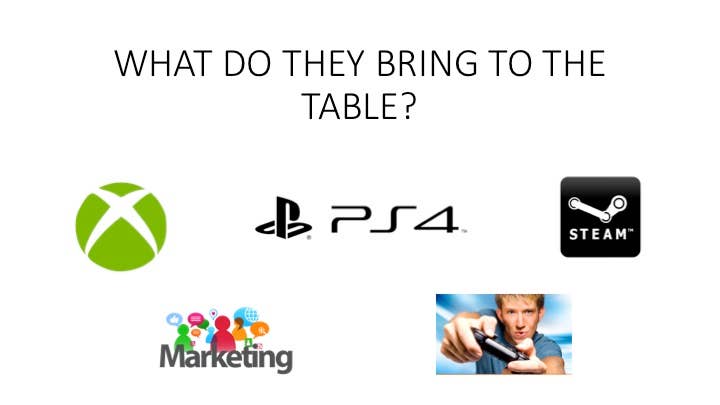
I've found that it's very easy when first starting out as an independent in any industry to rush into decisions. Luckily for me, I got a lot of my rash, stupid decisions out of the way when I was in a band when I was younger. This meant I was prepared for more going into running a games studio, but I definitely wasn't prepared enough.
One of the decisions I often found myself running head-first into was signing with a label, when really I should been asking myself the question, “Why do I want to sign with this label?”
Everyone has different reasons for working with publishers. We've worked with publishers because we needed the money to sustain the studio. We've worked with publishers to raise the profile of the studio and to help us grow. And we've worked with publishers because they were the best fit for the project.
At this point the questions I like to ask myself are:
- What are their relationships like with the platform holders?
- What is their marketing like?
- What is their QA/Localisation like?
What are their relationships like with the platform holders?
If you are looking to work with a publisher to help you get onto the platforms, because even with all the indie push it's not always easy, then these are the questions I think about:
- Do they have a proven existing relationship?
- Did they go straight onto the platforms?
- Did they have to go through any programs like Steam Greenlight?
- What sort of coverage have their titles got on the stores?
- Do they get front page coverage?
- Tie-ins with any other publishers/developers?
- Did they just get put onto the store and lost among the competition?
What is their marketing like?
As a small or mid-size developer you don't always have the funds for a full-time marketing overhead. Some people choose to use third-party services, and some studios work with a publisher to provide marketing. If one of the reasons you are signing with a publisher is marketing, then ask the following things:
- What coverage have their previous titles received?
- Are they getting traditional press reviews?
- Do their titles have full Metacritic scores?
- Do they have connections to Youtubers?
- Do they have connections to streamers?
- What is their total outreach across social networks?
- Ask them if you can see what the percentage of uptake is from their marketing campaigns, though they might not be willing to share this.
What is their QA/Localisation like?
As with marketing, QA and localisation are two areas that smaller studios don't tend to have covered - at least not fully, internally. So, ask:
- How many QA staff do they have?
- How many are internal?
- How many are external?
- How many QA staff are full-time assets assigned to your project and how many are floating resource that will be bouncing between numerous projects at once?
- Is there a set QA period for each milestone/release?
- Are there experts who have been through certification on all platforms multiple times, and have up to date versions of the certification expectations?
If they work with external QA teams:
- Who manages that relationship?
- Do you have direct contact?
- Who is in charge of upkeep of the bug database?
- Who creates the test plans?
- Is there an external producer, publisher side, and who will manage the process?
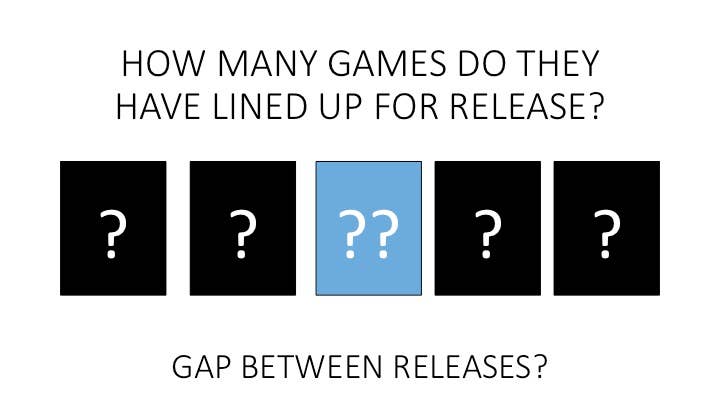
Next up on the topic of publisher choice: how many games do they have lined up for release and what is the gap between those releases?
How many games do they have lined up for release?
This is a big one for me. If you are signing with a publisher that is a smaller and more indie focused, and yours is one of three games they have coming out in a year, it's fair to assume you're going to get a lot more push than if you're one of 15 titles.
This may seem obvious, but it's worth checking with the publisher how many games they have signed and how many they plan on signing. The reality is that you can't do much about it if they lie/change their minds unless the contract specifically states it - which, personally, I have never come across personally - but it's at least worth checking and looking at their past quarter and year.
What is the gap between releases?
This ties in very closely to the last one, but it's worth calling out separately. How much space do they leave between their titles? If they ship three titles in a month it's very unlikely they put a massive push behind each of those titles.
Obviously there are exceptions: if there is a massive marketing department, for example, with great funding and a signed-off marketing plan. I'm not saying I've never seen a contract level marketing commitment, but they are rare, usually very loose, and in the publishers' favour.
Summary:
A quick summary about these slides. If you are really pushing for your title to be a success, and you feel you need a publisher to help you accomplish that, make sure you aren't working with a publisher that throws everything against the wall and sees what sticks. Don't be one of 25 titles coming out in a year for a small publisher that hasn't got the funding to support marketing campaigns for its games.
Money Split
These are the slides that came out and caused confusion, so I want to start this with a disclaimer:
DISCLAIMER: The numbers shown in these slides are a combination of different deals rolled into a single example to help me illustrate the point. The terms and the maths behind the following is all accurate for these deals, but the "Development Cost" number is not from the same deal as the "Recoup Rate." They have been combined purely to make the maths easier for me to go through. The Recoup Rate depicted is from a much larger amount of money at the development cost stage.

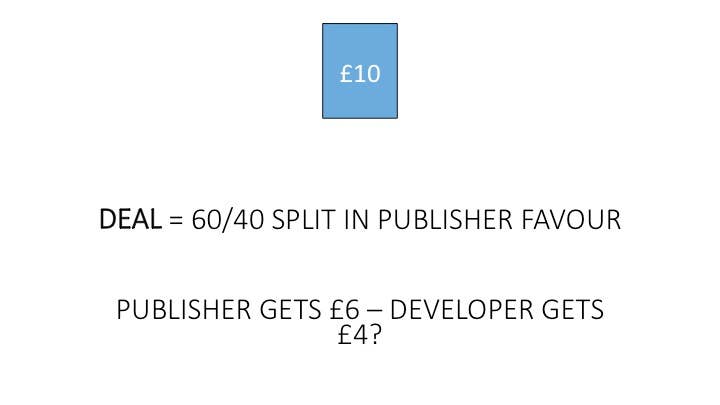
This was to show an example of what I initially thought was the process when you work with a publisher. If you sell a game for £10, and you have a royalty share that is a 60/40 split in the publisher's favour, then:
60% of £10 = £6 (Publisher)
40% of £10 = £4 (Developer)
£4 per copy to Developer
This, of course, is not the case.
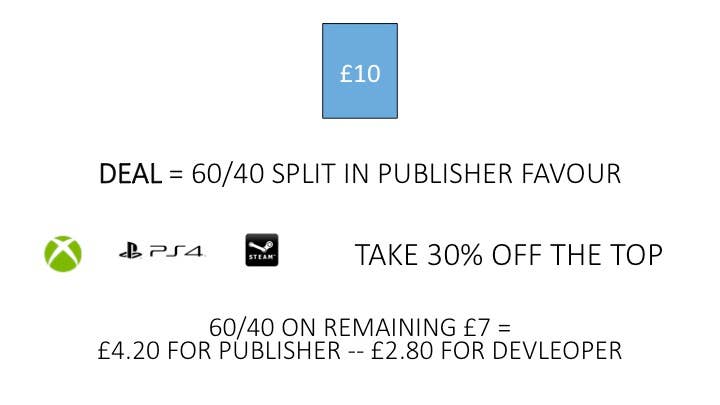
DISCLAIMER: The use of Xbox/PS4/Steam logos were here to summarise “platform holder.” At this point I don't know the actual amount that Steam takes, and the other platform holders are relevant at the time of posting this.
The first thing I learned was that the platform holders actually take a share of revenue straight off the top. So 30% of the sale goes to platform holders. This makes the updated maths:
30% of £10 = £3 (Platform Holder Cost)
Remaining Money = £7
60% of £7 = £4.20 (Publisher)
40% of £7 = £2.80 (Developer)
£2.80 per copy to Developer
However, this is not always the case with every deal. The first thing you need to look at are the publisher costs:
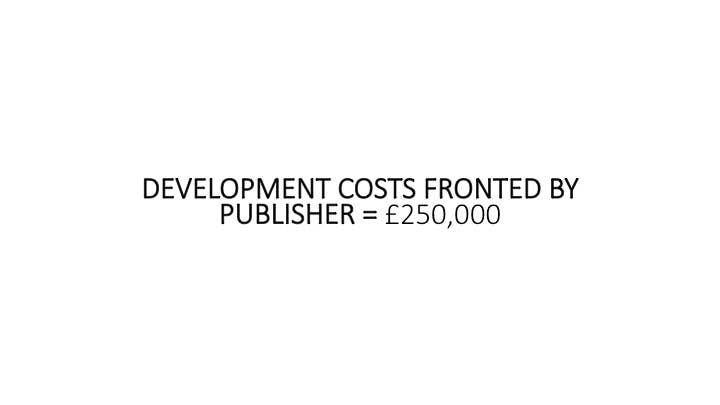

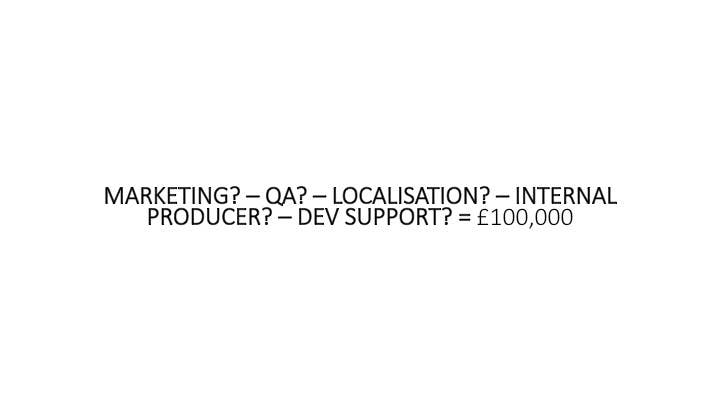

In this example you had a total of £350,000 upfront for the release of the game. This is the money the publisher has invested both into your team and into their internal teams to get the game to market. This example assumes that within your contract you have agreed that all costs incurred are to be recouped by the publisher.
This example also assumes - as is often the case in my experience - that the contract states that the developer will not receive any royalty until the publisher has fully recouped all its costs. I then showed a deliberately incorrect example:
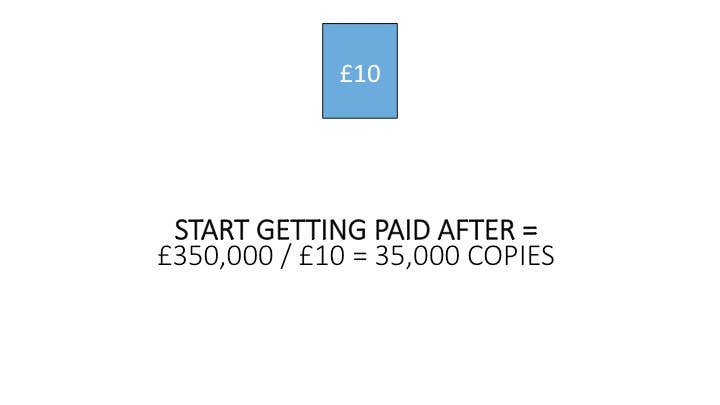

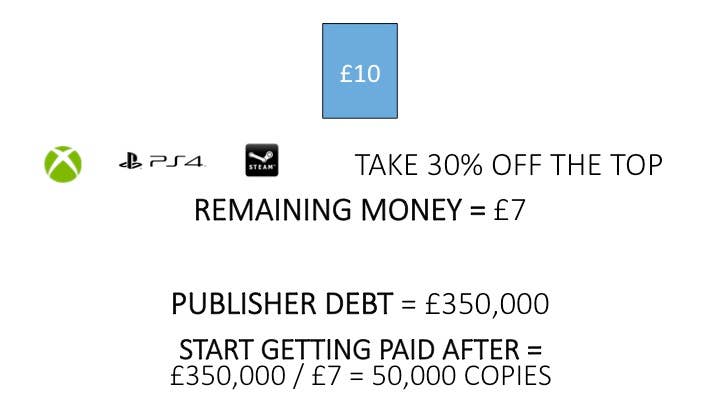
DISCLAIMER: Some slides have been edited due to them having animations in the live version.
So, with the proper maths, this shows that in this example:
Publisher Debt = £350,000
30% of £10 = £3 (Platform Holders)
Remaining Money = £7
100% of £7 = £7
£350,000 / £7 = 50,000 Copies
50,000 Copies Need To Be Sold For Developer To Start Earning
This not always the case. This is where Recoup Rate comes into play.
DISCLAIMER: This next part is where it all used to confuse the hell out of me, and still does to an extent. Bear with me.
This is where I then showed a slide containing an excerpt from a contract. I don't want to push it, so I'm going to type out the wording.
Example Contract Clause
“Recoupment Rate: Commencing on the date, [REDACTED] recognises Net Receipts with respect to the Title, [REDACTED] shall recoup Development Fees at a rate of 20% of Net Receipts.”
DISCLAIMER REMINDER: This recoup rate was NOT from a 350k deal which is why it's extreme, but it works for the example.

To be clear, this is an example of a contract which states both that the developer will not receive royalty share until the publisher is paid back, and that there is a Recoup Rate of 20%. So this means, in this example, that for every £1 of profit, 20p goes towards paying the publisher debt (development fees) and 80p goes to the publisher to take as profit until the full debt is paid off.
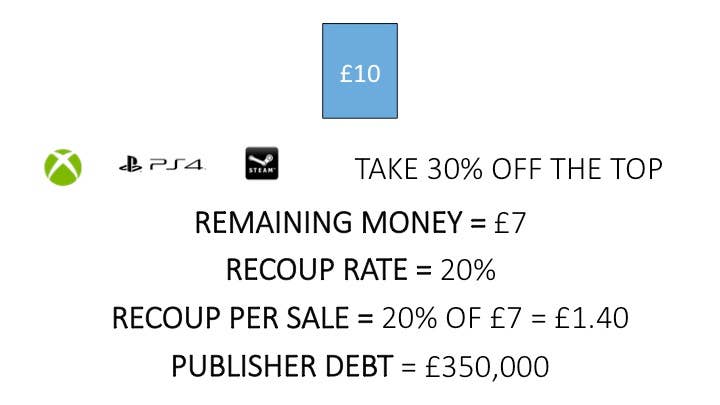
So let's break it down in this example:
Publisher Debt = £350,000
30% of £10 = £3 (Platform Holder)
Remaining Money = £7
Recoup Rate = 20%
20% of £7 = £1.40
£1.40 for each copy sold goes towards publisher debt
This means:
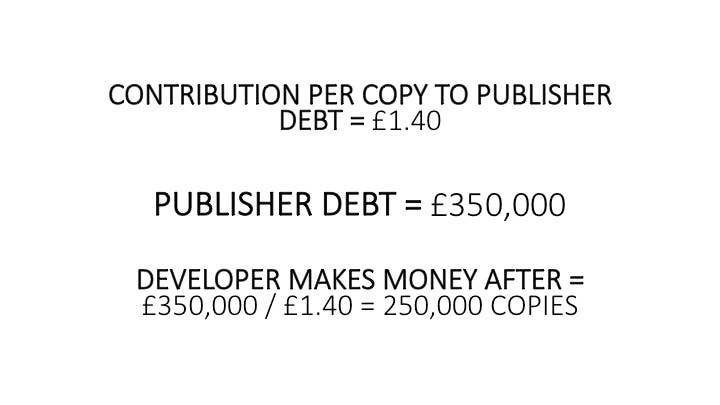
In this very extreme example, if you are paying debt back at a rate of £1.40 per copy of the game sold, and the debt totals £350,000, then the game will have to ship 250,000 copies before you see the first penny of royalty.
Whether the Royalty Rate is 20% or 90% the point here is to know whether it exists and if it does how many copies you have to sell before you will see royalties. This is part of the reason I don't base Dlala's future on royalty checks and projections, but I'll go into that shortly.
Currency Exchange
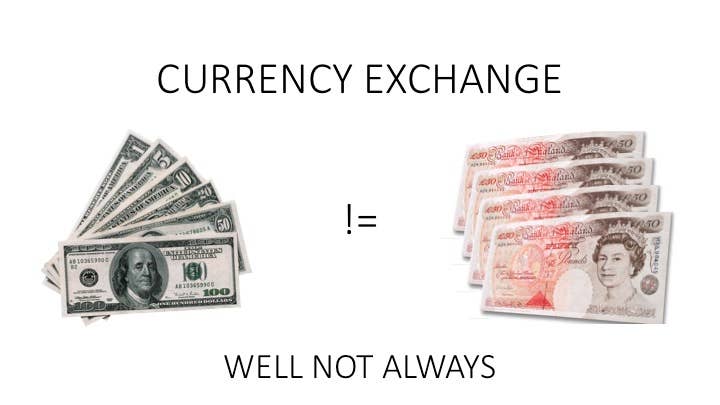
So this is quite a simple but important one. You have to know what currency you are getting paid in. Will it be your local currency or the chosen currency of the publisher? The reason this is important is because if you are getting paid in a different currency to your own, and that is what is on the milestones, it will not, most of the time, take into account fluctuating currency rates.
The example I give is some work-for-hire Dlala did in the past for a U.S. client, and we had our milestones in dollars. Two months into the contract the currency rate swung in our favour and we were suddenly getting paid more per milestone than I'd initially put in the spreadsheet because of it. Then, the currency rate swung back in their favour by the end of the year, which meant I was actually getting less per milestone then I'd put in the spreadsheet.
On top of this you have bank fees to think about. Sometimes this will be covered by the client/publisher, but sometimes you have to cover your own fees. On average, we would lose a few hundred dollars per milestone on our US-based contracts.
So, if you can, I'd recommend that you always get the contract in your local currency. If not, and you aren't living milestone to milestone, it's worth looking into foreign currency bank accounts so that you have more control over when you take the money out in your local currency.
Publisher Swerves

Publishers change their minds. A lot. You have to be prepared going into any sort of a deal with a publisher, especially for large sums of money, that they may have a business direction change.
You could start off working on a mobile free-to-play title, then halfway through development the publisher might decide that they don't want to back that model, and you need to switch the title to a traditional pay-to-own model. This has a massive impact on design and can quite often be impossible. There's a big difference between taking someone's money once and giving them a product, and a product which is repeatedly looking for the player to invest their cash. Now you also have to be prepared that, depending on development length, they may switch back again, but now they might feel that the original design no longer works.
This sounds like a crazy made-up example that no-one would put up with. It's not. If you are tied into a big deal and you have a team to sustain and feed each month, you can't just put your hands up and go, “Fudge this, I'm out.” I'm not saying this will always happen, I am just saying be prepared for it.
Kill Clauses

I hate this one just as much as the money stuff. Kill Clauses come in different shapes and sizes, but they are exactly what they sound like. This is a clause placed into a contract that allows the publisher/client to kill a contract either at specific milestones or, in some examples, at any point they choose.
What happens at this point, business wise, varies. I've never seen a Kill Clause that doesn't honour the work that has been done already building up to the kill. However, some clauses will honour the next milestone payment if you have already started working towards it. Like with everything in contracts, it really can vary from game to game.
Now this is important, and sounds really dramatic, but it's not always your fault and you can't blame yourself. You know those swerves I spoke about earlier? Sometimes a publisher swerves and decides that the product doesn't fit in its line-up anymore. I've seen it happen with concepts that everyone loves, with concepts that are 80% complete, and concepts that are about to go to market. Unless they are breaching contract, you can't do anything.
It sucks.
But you have to pick yourself up, look at the situation and push through. With Dlala, Craig [Thomas, CCO] and I have a rule: every game is there to take you to the next one. Whether that means the money you make, the profile you raise, the connections you make or anything else. As long as each game puts you in a position where you can move onto the next one, that is all we can ask for. As we've grown to 14 members that has felt a lot harder, but the mentality still hasn't changed.
Managing A Contract With Failure In Mind
As I've got older I've become very, very stoic. When Dlala signed its biggest deal to date I didn't really show excitement. When we had a project canned I didn't really get upset. I am always thinking about what's coming next and what happens if it goes wrong.
I want to be very clear: I do not want a single person in my team to be worrying about failure, the project getting cancelled or the company going under. I want them all loving their jobs and creating fantastic games of which we are all proud.
It's my job to think of all the horrible shit that this often unstable industry brings with it. One of the ways I do this is to manage contracts with failure in mind. I arrange the milestone payments of a contract so that, if the project is cancelled at any point, we aren't suddenly sitting there with only a week's worth of money in the bank. This is from personal experience, but I have never met a publisher that will back out of a contract because they weren't happy with how you laid out the milestone payments. So it's worth trying to lay them out in a way that is sensible for the publisher (don't put 50% of money for 10% of work), and that is sensible for you (don't take 10% of money for 25% of work). It is a lot easier for small studios to have more control over these type of figures than it is for large studios with hundreds of employees, purely due to the size of their overheads.
Ties To The Future
A few things I touched on at the end are clauses such as sequels, merchandise and other similar mechanics.
Sequels
In most of the deals I've seen for launching your own IP with publisher involvement, the publisher will quite often want first refusal on any sequels or spinoffs for a game. Let's say we published a game called “Generic Game X” and we did so with Publisher 1, if we decided the best move for the studio was to do “Generic Game X 2” we would need to go to Publisher 1. Now, if it does want to publish the sequel, legally it has to present a reasonable deal for doing so. It can't just say yes and then offer you a tenner to do it. However, if Publisher 1 passes, the clause should state that you could then take it to Publisher 2.
Merchandise
Similar to sequels, the publisher will often want first refusal on any merchandising agreements. This will usually have stated in it a proposed split on revenue from merchandise, etc. If not, it will often point to the creation of a new agreement to cover this.
Similar Mechanics
Now this is an interesting one, and one I could do with a lawyer to explain it to me a bit better. You come across a clause that states a period of time - usually based on game's release date - in which you are not allowed to release another title with similar mechanics. Effectively, if we did “Generic Game X” and then we took the main mechanics of the game and launched “Not Quite So Generic Game X,” we could be in breach of this clause.
Parting Thoughts
There are two main points I tried to round up with:

I cannot say this enough. Do not sign anything without getting a professional who is experienced in the appropriate country's law to check it first. The best money Dlala spends is on our Solicitor in UK, Lawyer in US and our accountants.
I'm not a particularly trusting person as it is, but dealing with music and games contracts has made me even worse. As much as you like someone, even if you are friends, you have to get the contracts checked. If the publisher/client offers a recommendation of a lawyer, thank them for it but find your own.

Magic Money is what I call money that doesn't exist, or doesn't have a set commitment - such as projected sales. I don't work any projected sales figures into Dlala's money spreadsheets, because it doesn't exist and it might never exist. Nothing scares me more than basing our future on money that could magically disappear from the spreadsheet, so I only work in numbers for contracts I've signed. Even if a contract has an extension clause in it with post-launch milestones, I won't put those in until we reach that time, because of things such as kill clauses and swerves.
I know how lucky I am to be able to do that, but I would recommend that if you are able to, and you don't have investors to answer to, don't base the future of your employees on a game's success.
The End
For those of you that made it to the end, thank you for taking the time to hear me out and get some context on some confusing slides.
I want to make it very clear. This is not me saying do not work with publishers. Working with publishers is still, currently, Dlala's first choice when releasing a title. This was just a chance for me to tell you guys about some of our experiences, so that you at least hear about some of the problems we've come across.
